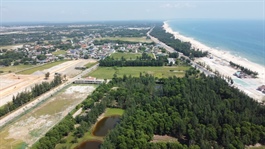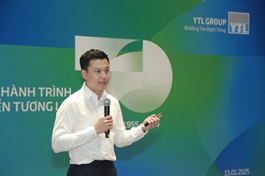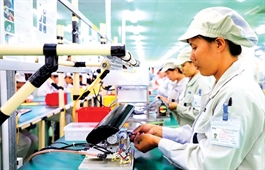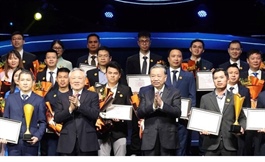Innovative startup ecosystem garnering attention
Innovative startup ecosystem garnering attention
Vietnam’s startup ecosystem is set to grow stronger on the back of new initiatives to develop qualified workers at home and abroad.
The inauguration of the Innovation and Startup Incubator (VISI) at Vietnam National University in Hanoi took place last month.
As a pivotal entity under the Centre for Knowledge Transfer and Startup Support, VISI is positioned to act as a crucial connector of resources to develop the university’s startup ecosystem. It will operate as a business entity under centre, aiming to incubate technology and develop spin-off/startup enterprises originating from universities.
VISI director Tran Phi Long said, “The incubator was established to serve as a bridge between knowledge, technology, and business practice, helping turn the creative ideas of scientists and students into high-value products and services. We are committed to comprehensive support, from technology incubation and enterprise development to connecting resources and market opportunities.”
Long called for collaboration from businesses, organisations, and investment funds to support innovative startup ideas, adding to VISI’s commitment to accompanying scientists and students on their journey.
He also noted significant progress in Vietnam’s startup ecosystem. “If we go back 15–20 years, during the emergence of tech companies like VNG, Vatgia, and 24h, no one really mentioned the term startup. But by 2016, when the Ministry of Science and Technology (MoST) launched the first Techfest, followed by national startup competitions extending to universities and localities, it began to gain attention,” Long said.

Innovative startup ecosystem garnering attention, Source: freepik.com |
The role of students in the national startup ecosystem was previously recognised through a government scheme that aimed to inspire entrepreneurial spirit among students and equip them with the knowledge and skills necessary for entrepreneurship during their academic years.
To date, universities have issued policies supporting student and faculty innovation and entrepreneurship. Around 75 per cent of universities have established innovation and startup spaces to develop ideas and execute projects.
The government’s focus on the startup ecosystem is also evident through the Techfest series of events, spearheaded by the MoST, aimed at fostering the national innovative startup ecosystem. These events, running from late November to year-end, take place across localities including Haiphong, Vinh Phuc, and Can Tho.
Meanwhile, ministries have presented bold directions for ecosystem development, emphasising the need to harness the creativity of overseas Vietnamese intellectuals and women.
Pham Thanh Binh, Deputy Minister of Foreign Affairs, highlighted that the overseas Vietnamese community comprises over six million individuals.
“The stories of Vietnamese individuals making their mark in high-tech fields such as AI, biomedicine, and new materials are everywhere on social media. Connecting Vietnam’s innovative startup ecosystem with overseas experts and advisors is vital for keeping up with technological trends and new development models,” said Binh.
For over a decade, the Ministry of Foreign Affairs has collaborated with other ministries and localities to realise policies aimed at leveraging external resources, particularly intellectual capital from the overseas Vietnamese community.
To support women-led startups in past years, the government entrusted the Vietnam Women’s Union with implementing a particular scheme on the issue, yielding notable results.
Tran Lan Phuong, deputy chairwoman of the union, said, “One of the standout achievements of the scheme over the past seven years has been training women to enhance their capabilities in e-commerce, benefiting their business and sales. This is evident in the 30 per cent growth in cross-border sales of products made by women compared to pre-scheme levels.”
According to Phuong, the venture has identified and nurtured startup ideas, transforming them into reality by the establishment of cooperatives and enterprises that apply sci-tech creatively.
At Techfest Vinh Phuc, Deputy Minister of Science and Technology Hoang Minh remarked that Vietnam’s innovative startup ecosystem was transitioning into a phase of expanded scale and depth.
“In the past decade, Vietnam has passed its initial phase of building an innovative startup ecosystem by laying the foundational institutional framework, establishing support organisations and networks, cultivating communities, promoting an innovative culture, and attracting startups, small businesses, universities, research institutes, and investment funds,” he said.
In 2024, Vietnam’s innovative startup ecosystem boasted over 4,000 startups, including two unicorns, 11 companies valued at over $100 million, more than 1,400 support organisations, over 200 coworking spaces and 200 investment funds, 35 business accelerators, around 80 incubators, approximately 170 universities and colleges engaged in innovative startup activities, and over 20 national and local innovation centres, according to the MoST.
Vietnam currently ranks 56th in the Global Startup Ecosystem Index by Startup Blink.























